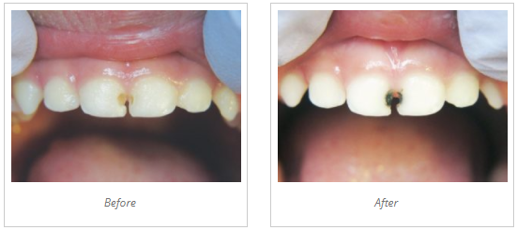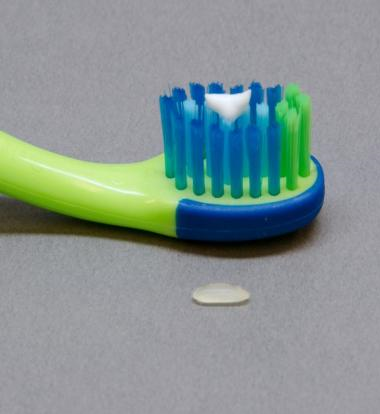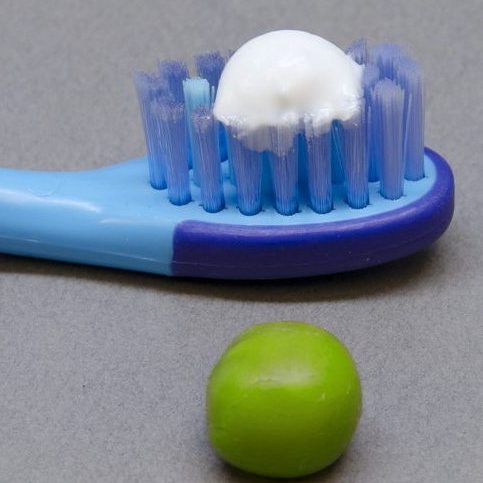We see kids starting from birth. The American Academy of Pediatric Dentistry recommends that every child see a licensed dentist by age 1! If your child is receiving care at FIGHT Pediatrics, we can coordinate their dental and medical visits for your convenience.
Teeth are important! Especially baby teeth!
Click below to learn more about how to best take care of your child’s teeth. If you’d like to make an appointment with our dentist, please call 215-525-3046.
- Caring for your child’s teeth (0-2 years old) (PDF)
- Caring for your child’s teeth (2-5 years old) (PDF)
- Caring for your child’s teeth (6 years old and above) (PDF)
- General Frequently asked questions about teeth! (PDF)
- Silver Diamine Fluoride (SDF) Information Handout – Children (PDF)
Dental Care – Birth to 2 years old.
- Use a warm soft cloth or infant toothbrush with a SMEAR of fluoride toothpaste, the size of a grain of rice
- Establish a dental home for your child – visit the dentist by the child’s 1st birthday
- Do not put the child to sleep with a bottle filled with formula, milk, or juice. Must be water only!
- Avoid “as-desired” night-time breastfeeding
- By the 1st year, you should start weaning off of bottles – start using sippy or spill-proof cups
- The caregiver’s oral bacteria can be transmitted to the child. This can cause early childhood caries! Do not share utensils, do not lick or clean pacifiers or utensils with your mouth.
- Thumb sucking and pacifier usage is NORMAL for this age
- Curiosity and teething can cause children to suck and bite on all types of objects. You will notice an increase in drooling and slight agitation
Dental Care – 2 to 5 years old
- Use a PEA-sized amount of fluoride toothpaste
- Schedule dental visits every 6 months
- Thumb sucking and pacifier usage should be discouraged by this age. If not, damage to the teeth and bones can occur!
- Begin flossing when teeth start to touch. This is especially
- important in back teeth (molars). Bacteria and plaque can cause cavities in between these teeth.
- Check for signs of cavities – white spots are early signs of cavities, which can progress rapidly to brown or black spots of tooth decay!

- Limit juice intake to 4-6 oz per day, and snacking to 2 times per day.Frequent snacking can cause the teeth to be bathed in sugar, causing cavities.
- Rule of Two’s – Build a habit of: Brushing 2 times a day x 2 minutes
Dental Care – School-age Children
- Continue to use fluoride toothpaste
- Flossing is especially important as adult teeth start to come in. Itremoves bacteria and plaque in areas unreachable by the toothbrush.
- Caregiver should supervise brushing until at least the age of 7-8 years.
- Limit frequent snacking, sticky snacks, carbonated beverages, andsports drinks. Acidic and sugary drinks bathe the teeth in sugar!
- Use xylitol gums or xylitol candies for sweet and satisfying, but cavity- free, treats! Xylitol is a plant-derived, all-natural sweetener that does NOT cause cavities.
- Mouth guards (sport guards) are extremely important for any type of contact sports.
- Wisdom teeth (third molars) can start erupting and cause pain or discomfort – Visit the dentist and have it checked out!
- Rule of Two’s – Build a habit of: Brushing 2 times a day x 2 minutes
Question: Are my child’s baby teeth important even though they’re not permanent?
Answer: Yes! Baby teeth guide adult teeth and help them come in straight, while also allowing your child to chew food and stay healthy.
Dental Care – Frequently Asked Questions
Question: Can cavities become a big problem for kids? What do they look like?
Answer: Yes, cavities can get worse, and fast! This can make it hard for your child to chew and enjoy food, and can lead to more serious dental problems if left untreated.

White Spots – early signs of cavity Mild Moderate Severe
Question: My child sucks their thumb and loves their pacifier. Is this something that I should be worried about?
Answer: Not right away, but prolonged habits after the age of 4 can cause a dental and skeletal malformation called an open bite.

Question: My dentist mentioned “Dental sealants.” Is this something my child should have?
Answer: Yes! Sealants provide a “SEAL” to protect the tooth surface from bacteria and acids that can cause cavities.
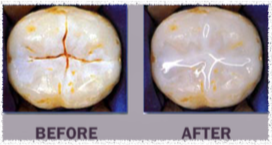
Question: I know it’s important for my child to brush their teeth, but how often should they do it? And for how long?
Answer: You should brush your child’s teeth for 2 minutes x 2 times per day with fluoride toothpaste. Your child needs help brushing their teeth until at least the age of 6 or 7!
Question: What is fluoride varnish? Should I let my dentist or primary care doctor put it on my child’s teeth?
Answer: Yes, fluoride varnish is vitamins for teeth. It can prevent tooth decay and is a naturally occurring mineral that strengthens teeth.
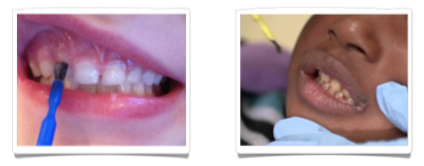
Silver Diamine Fluoride (SDF) Information Handout – Children
Key points:
- SDF stops dental decay
- It also stains your child’s teeth
- Takes about 1 minute to apply with no noise and no drilling
- Kills the bacteria that cause tooth decay
We recommend it for:
- Young children
- Baby (a.k.a. primary) teeth
- Children with fear of the dentist
- Children with a lot of decay
- Posterior teeth
- At initial visits if there is a lot of active decay
Contraindications:
- If your child is allergic to silver
- Major concerns about how it will look
